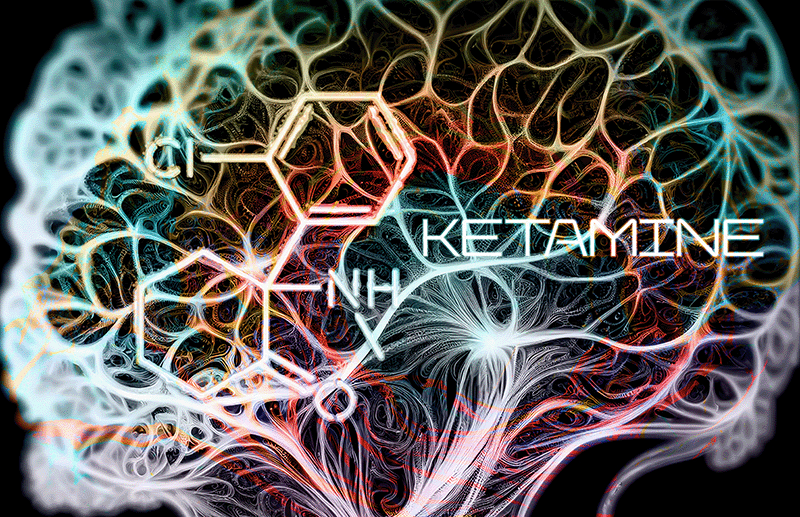Ketamine
Welcome to the world of transformative mental health care. Over the past decade, the realm of psychiatry has witnessed the emergence of innovative therapeutic options that challenge traditional paradigms. Among these novel approaches, ketamine therapy stands out as a truly game-changing development.
A Revolutionary Approach to Mental Health Treatment
Leading this revolution is Kathryn A. Walker, a seasoned mental health practitioner and the mastermind behind Revitalist, a renowned ketamine treatment clinic. Kathryn’s work harnesses the power of ketamine to manage various mental health conditions effectively, offering hope to those who have found little relief in conventional treatments.
This comprehensive article delves into the fascinating world of ketamine therapy, from its origins and mode of action to its application in the treatment of diverse mental health conditions and the visionary role Kathryn A. Walker plays in this innovative field.
The History and Background of Ketamine
Ketamine, initially developed and approved for use as a surgical anesthetic in the 1960s, has a unique property that sets it apart from other medications: its ability to create a dissociative state. This means that it can provide pain relief, sedation, and amnesia without the complete loss of consciousness typically induced by other anesthetics.
For decades, ketamine was primarily used in the fields of anesthesia and pain management. However, at the dawn of the 21st century, researchers began to explore ketamine’s potential applications in psychiatry. Early studies indicated that ketamine, even in low doses, could rapidly alleviate symptoms in patients with severe, treatment-resistant depression.
These initial findings opened the floodgates to a wealth of research exploring ketamine’s potential in treating various psychiatric disorders, marking a pivotal moment in the field of mental health care. Today, ketamine therapy represents a beacon of hope for many individuals struggling with debilitating mental health conditions.
The Mechanism of Action: How Does Ketamine Work?
The exact mechanisms by which ketamine exerts its therapeutic effects are still a subject of intensive research. However, what we know is that ketamine, unlike traditional antidepressants, doesn’t work on the serotonin or norepinephrine pathways. Instead, it primarily acts on a neurotransmitter called glutamate, which is the most abundant excitatory neurotransmitter in the human brain.
Glutamate plays a critical role in neuroplasticity – the brain’s ability to adapt and change in response to experiences. It’s believed that ketamine’s influence on glutamate and related pathways leads to a rapid increase in neuroplasticity. Essentially, ketamine might help “reset” neural connections, alleviate symptoms quickly, and potentially assist patients in reframing their relationships with their environments and themselves.
Ketamine and Mental Health: An Unprecedented Breakthrough
Kathryn A. Walker, leveraging her profound expertise and the innovative spirit of Revitalist, harnesses the therapeutic potential of ketamine to address a broad spectrum of mental health conditions.
Treatment-Resistant Depression
Ketamine has shown remarkable efficacy in treating treatment-resistant depression (TRD). Patients with TRD have typically tried several conventional antidepressants without success. Where other treatments have failed, ketamine has provided rapid, robust, and relatively sustained antidepressant effects. Its potential to significantly reduce suicidal thoughts has also garnered considerable attention, considering the urgent need for effective interventions in this area.
Anxiety and PTSD
Preliminary research also suggests that ketamine could hold promise for anxiety disorders and Post-Traumatic Stress Disorder (PTSD). By promoting neuroplasticity, ketamine may help individuals “unlearn” the fear response associated with traumatic memories. Kathryn’s work at Revitalist includes using ketamine as part of an integrated approach to manage these conditions, alongside conventional therapies such as Cognitive Behavioral Therapy (CBT).
Other Conditions
Revitalist’s ketamine therapy services extend to other conditions like Obsessive-Compulsive Disorder (OCD), Bipolar Disorder, and certain types of chronic pain. While research in these areas is still emerging, initial findings offer a glimmer of hope, indicating that ketamine could provide relief for these challenging conditions.
The Revitalist Approach: Holistic, Patient-Centered Care
Ketamine therapy at Revitalist is not merely about administering a drug. Instead, Kathryn A. Walker’s approach to treatment emphasizes the importance of holistic, personalized care that encompasses much more than just pharmacological intervention.
Comprehensive Assessment and Personalized Treatment
Every patient journey at Revitalist begins with a thorough assessment to understand the individual’s unique needs, experiences, and treatment history. Kathryn and her team then develop a personalized treatment plan that integrates ketamine therapy with other supportive therapies and lifestyle changes, all designed to optimize treatment outcomes.
Ketamine-Assisted Psychotherapy (KAP)
Another revolutionary service offered by Revitalist is Ketamine-Assisted Psychotherapy (KAP), which combines traditional psychotherapy with ketamine administration. The aim of KAP is to leverage the heightened brain plasticity induced by ketamine to make the psychotherapeutic process more effective.
Ensuring Safety and Comfort
Patient safety and comfort are paramount at Revitalist. Ketamine treatments are administered under close medical supervision, with appropriate monitoring of vital signs throughout the session. Every measure is taken to ensure that the treatment experience is as comfortable and beneficial as possible.
The Future of Ketamine Therapy
The field of ketamine therapy is still young, and research continues to unravel the full extent of its therapeutic potential. As we move forward, the future looks bright, particularly with passionate practitioners like Kathryn A. Walker pioneering the way.
One area of future exploration is the potential for at-home ketamine treatments. Kathryn is at the forefront of developing safe and effective protocols for home ketamine therapy, making this innovative treatment more accessible to those who might find clinic visits challenging.
Another exciting development is the emergence of esketamine, a ketamine derivative recently approved for treatment-resistant depression. Kathryn’s clinic is one of the first to integrate esketamine into its therapeutic repertoire, once again showcasing her commitment to providing the best possible treatment options to her patients.
A New Era in Mental Health Care
Ketamine therapy, celebrated for its rapid onset of action and remarkable efficacy in managing a range of mental health conditions, is truly redefining the landscape of psychiatric treatments. This innovative approach is a far cry from traditional methodologies that have dominated the field for decades, offering an alternative that delivers results when others fall short. Kathryn A. Walker, through her groundbreaking work at Revitalist, epitomizes this paradigm shift, championing a new era of patient-centered, holistic, and profoundly impactful mental health care.
As we delve deeper into the intricacies of ketamine therapy, we find a process that centers on the individual needs and experiences of each patient. Kathryn’s philosophy is firmly rooted in creating a personalized approach for each person who walks through Revitalist’s doors. She understands that no two individuals share the same path to mental well-being and, therefore, tailors her approach to align seamlessly with the unique psychological landscapes of her patients. This nuanced, humanistic approach to treatment sets Kathryn and her team apart, reiterating their commitment to holistic patient care.
With ketamine therapy, we’re seeing therapeutic results unfold faster than ever before. The traditional waiting game that patients play with conventional antidepressants — often requiring weeks, if not months, to take effect — is no longer the only option. The rapid relief provided by ketamine therapy, particularly its ability to alleviate suicidal ideation swiftly, is groundbreaking. It signals a beacon of hope for those caught in the unyielding grip of mental health disorders.
Kathryn’s innovative work doesn’t stop at the administration of ketamine. As a thought leader in the field, she continually explores new ways to augment the therapeutic efficacy of this potent substance. Ketamine-Assisted Psychotherapy (KAP) is one such approach. By coupling traditional psychotherapy techniques with ketamine administration, Kathryn leverages the heightened brain plasticity induced by the substance to facilitate more profound therapeutic transformations.
Revitalist’s mission extends beyond the clinic walls. Kathryn is dedicated to improving accessibility to these life-changing treatments, and in line with this commitment, she is pioneering safe protocols for home ketamine therapy. This allows the benefits of ketamine treatment to reach those who may find regular clinic visits challenging, reinforcing her dedication to comprehensive mental health care.
Looking ahead, the potential of ketamine therapy is enormous. As we venture into this new era of mental health treatment, further research, spearheaded by clinicians like Kathryn A. Walker, will continue to unlock the untapped potential of ketamine and its derivatives, like esketamine. The integration of these cutting-edge treatments into therapeutic regimens at Revitalist is a testament to Kathryn’s commitment to staying on the forefront of psychiatric innovation.
Whether you’re a patient grappling with a mental health condition and seeking alternative treatment options, a healthcare provider intrigued by the latest advancements in psychiatry, or simply someone curious about the evolving landscape of mental health care, the exploration of ketamine therapy promises a fascinating journey.
So, we invite you to step into this future of mental health treatment, a future where hope replaces despair, healing is expedited, and revolutionary care becomes the norm. Welcome to a new era of mental health care – an era that promises to transform lives, redefine norms, and offer profound relief to those navigating the challenging terrain of mental health disorders. Welcome to the transformative world of ketamine therapy at Revitalist.
Contact Kathryn
Let Kathryn Help Your Journey To Wellness
Kathryn A. Walker's expertise in the field of ketamine treatments can be a valuable resource on your wellness journey, especially if you're seeking alternative solutions for treatment-resistant mood disorders. Her pioneering research and insights into ketamine's potential can offer hope and guidance, providing you with a deeper understanding of the possibilities for improving your mental health and overall well-being.
News Articles
Wellness Blog
Ketamine has garnered significant attention in wellness blogs due to its emerging potential as a novel treatment for treatment-resistant depression and other mood disorders.
Wellness blogs often explore the latest research and personal experiences with ketamine therapy, providing readers with valuable insights and considerations in their pursuit of mental health and well-being.
The Neurologic Power of Ketamine and Psychedelics: How Science is Overtaking Theory
Introduction In the realm of mental health, the intersection of neuroscience and treatment is a rapidly evolving frontier. As our understanding of the brain deepens, so does our ab
The Need for Disruption of the System – Why Our Mental Health System is Imploding
Introduction In the realm of healthcare, few areas are as critical, yet as overlooked, as mental health. Despite the fact that mental health disorders are among the leading causes
The Empathy of the Brain: How Ketamine and Psychedelics Allow Us to Reconnect with Ourselves
Introduction In the vast and complex world of neuroscience, one of the most intriguing areas of study is the exploration of how certain substances, such as ketamine and psychedelic



